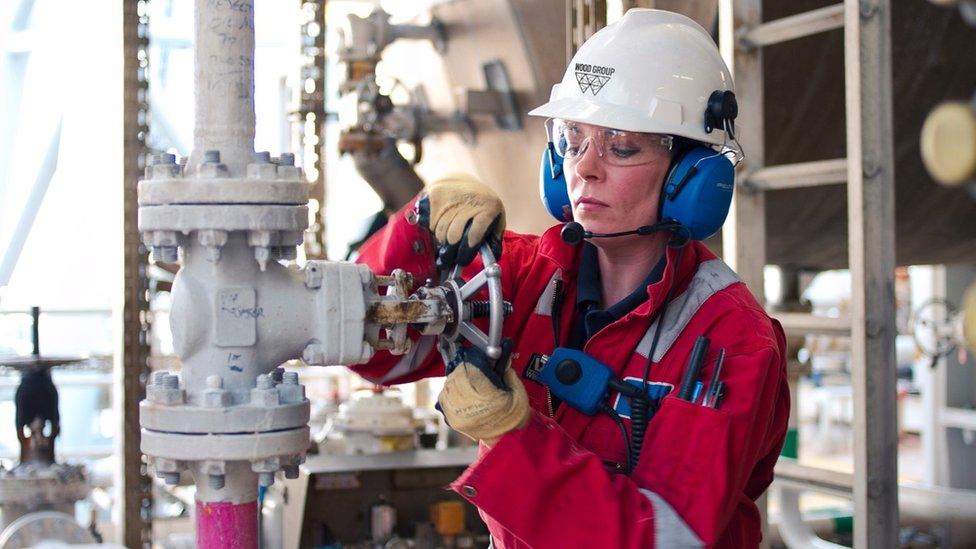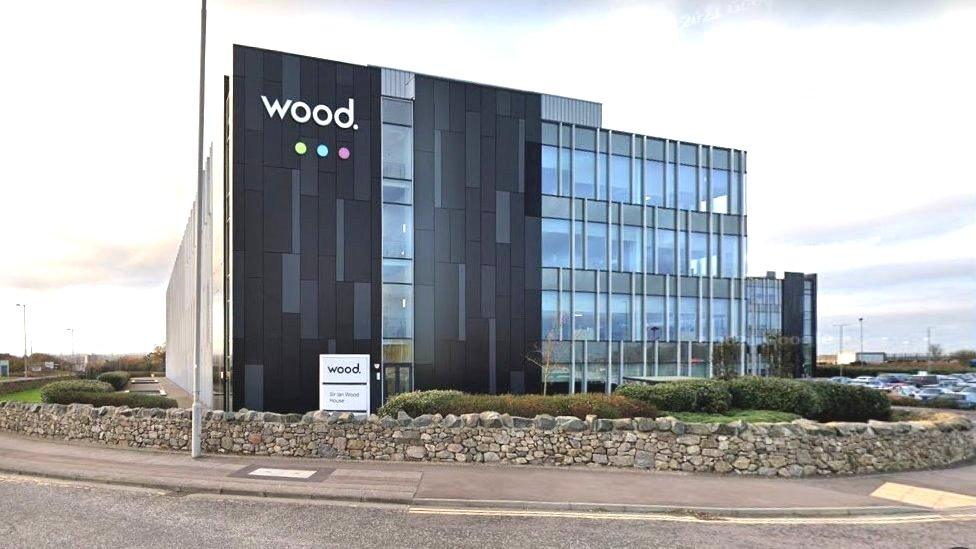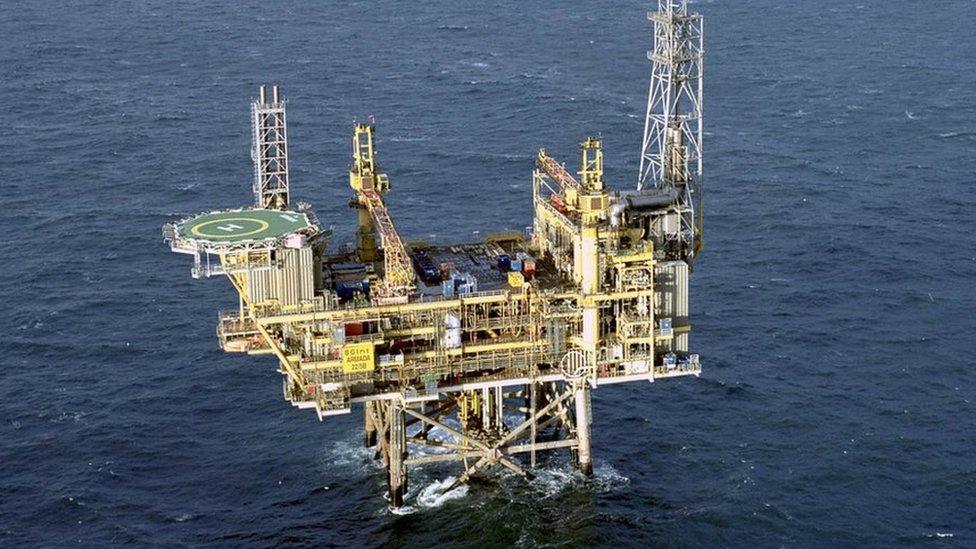Knocking on Wood’s door: US investors eye engineering giant
- Published

One of Scotland's biggest corporate success stories is now being sized up for takeover. Wood has opened the door to a New York-based suitor.
It follows a long slide in its share price, partly propelled by a difficult takeover of a US engineering giant and by attempts to diversify from oil and gas.
Such takeovers can sometimes help firms grow, but they often mean that clout at the Scottish HQ and spending power depart.
It's the biggest Scottish corporate tree to grow out of five decades of North Sea oil, but Wood is now being sized up for either felling or extensive surgery.
Wood, formerly and still formally known as John Wood Group, has opened the door to a large American investment fund Apollo Global Management, to let it rifle through the data and firm up its conditional offer to shareholders.
The Aberdeen-based company had resisted the first four conditional offers made earlier this year, saying they undershot its potential value.
The fifth one, valuing Wood at £1.66bn and 59% more than the share price before the first offer was made, is different.

Wood's head office is based in Aberdeen
The board of directors has listened to Wood's investors, mainly big institutional funds, and decided it is in those shareholders' interests to open the books. Apollo gets to do its due diligence before deciding on a formal offer.
The rules of this game, policed by the Takeover Panel, had meant a deadline for a formal bid by Wednesday this week.
With Wood and Apollo now co-operating, but making neither a firm offer nor with the board's recommendation to shareholders to accept, that deadline has been moved to 17 May.
Break up
So far, it's all about the share price. Investors have seen that fall from 800 pence six years ago to 400 pence before the pandemic, and then to 150 pence in February. News of the Apollo bid pushed the price up again, towards the 240 pence price which Apollo has indicated it will bid.
What follows any successful takeover is far from clear. Apollo is based in New York, and has more than $500bn entrusted to it by its investors. It is one of those funds which buys assets it judges to be under-valued.
It reckons it can get more value out of those assets, and such funds typically have an exit date in mind. They don't sit on assets the way patient investors do. They move things on.
They do so without any sentimental attachment to the corporate history. Companies can be sold to others or broken up.
Sometimes, they are used as a base from which to invest in a growing market or from which other firms can be acquired and bolted on.
Under siege
The location of the headquarters doesn't make much difference to these calculations. But from the point of view of the Scottish economy, the persistent trend towards losing headquarters operation can make a lot of difference.
Decisions at head office are more likely to favour the host nation in which the executive team operates. They spend money on business services, from lawyers to accountants to chauffeurs and caterers, while the top salaries are spent in country.
Recent years have seen Aggreko, a global leader in temporary power based in Glasgow and Dumbarton, taken over by two investment funds.
In Edinburgh, Capricorn, formerly Cairn Energy and a success story in drilling for oil, has been under siege.
Stagecoach, set up by Sir Brian Souter and Dame Ann Gloag, has been sold to a company controlled by a German bank.
Alexander Dennis was headquartered in Falkirk. The bus-builder now reports to its owner's HQ in Winnipeg, Canada.

Stagecoach buses are now owned by a company controlled by a German bank
Miller Homes, a family firm based in Edinburgh has been bought and sold by private equity funds. A year ago, it was acquired by Apollo Global Management. It said then that the plan was to invest and expand its housebuilding across Britain, and it remains based in the Scottish capital.
Bank of Scotland, Royal Bank of Scotland, TSB and Scottish Widows retain their registered brass plates in Edinburgh, but little of the corporate power resides in Scotland.
Looking further back, Scottish Power was taken over by Iberdrola of Spain. Scottish and Newcastle was carved up by rival brewers.
Salmon farming began in Lochaber, but it is mostly owned in Norway and the Faroes. And Scotch whisky is around 80% controlled from outside Scotland.
If you were to be surprised that ownership of Scottish business is not a political issue, you would not be alone.
Predator and prey
One reason why this is accepted is that many Scottish companies have thrived as corporate predators. That was part of Wood's success story. But playing by those rules means you can also become prey.
Part of its more recent, less successful story was the acquisition of AMEC Foster Wheeler, a US-based engineering giant. It appeared to have a lot in common and also to offer access to new markets for Wood.
But it carried the legacy of some expensive disputes over contracts. The current Wood management say it is only with the most recent annual figures that it has drawn a line under that.
They have also moved away from a big push into installing renewable energy capacity, in which the contractor is bound to deliver on a fixed price contract. Now, it wants to focus on "reimbursables" in which the client carries, or at least shares, the risk of costs over-running.

Wood completed a £2.2bn takeover of Amec Foster Wheeler's north sea operations
Wood wanted to move away from dependence on engineering services in oil and gas fields, which bring peaks and troughs according to volatile price cycles of that industry, but in which windfall profits go to the production client company.
The Aberdeen firm, employing 35,000 people in more than 60 countries and with turnover last year rising 8% to $5.4bn(£4.4bn) still wants to diversify into bespoke projects.
It aims to do more in carbon capture, in new renewable energy projects and to deliver complex industrial systems for life sciences. Though for now, these divisions bring in only 6% of revenue.
Wood designs and builds chemical works and refineries. It opted out of AMEC's nuclear past, and last year sold up its consultancy in the built environment.
Yet for all its efforts to diversify, 56% of revenue still comes from projects and operations in oil and gas.
That, then, is what Apollo analysts have a month to consider before their next move determines Wood's fate.